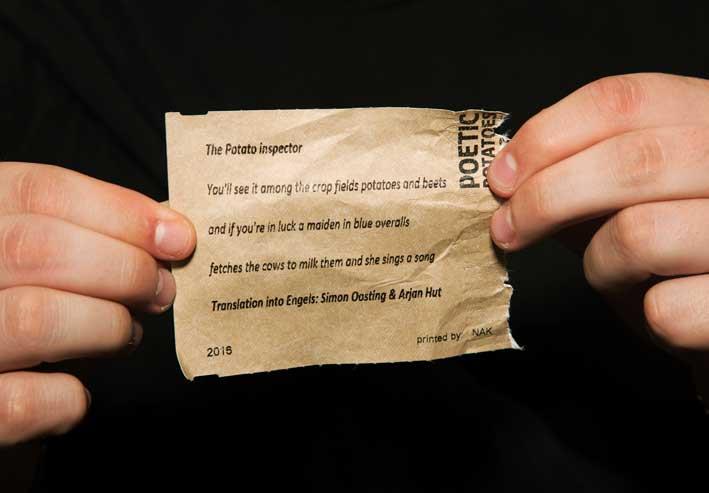Malta and Leeuwarden, a city in The Netherlands, have been exchanging potatoes and potato seeds since the 1850s. However, in 2015, a handful of customers would open their sacks, only to find something more than just the knobby vegetable inside, but a poem, with words inspired by the very thing the paper was surrounded by, potatoes. Think Willy Wonka's Golden ticket, but with local poetry.
Besides their starchy relationship, another thing which fuses Malta and Leeuwarden is that they will both hold the honorable title of European Capital for Culture in 2018.
Inspired by both these factors, along with her interest for the promotion of lesser-used languages, Dutch local Frouke De Jong came up with the Poetry in Potato Bags project, Leanne Ellul, Malta's project co-ordinator explained, which is part of the cultural programme of Valletta 2018.
Eight different poets a year write one poem each with the same starting point as inspiration of the poems; potatoes. "Some take the social aspect of potatoes, some tap on memory, others senses," said Leanne, explaining that the project has especially interested locals around the country which have a deep potato tradition, such as Qrendi.
"We aim to disseminate poetry as much as possible. Potatoes are staple food, which we take for granted most of the time. For many people they are just potatoes, but the truth is that it goes beyond that," said Leanne. "This staple food that is very, very basic, and that we take for granted, can also be poeticized."
She goes on to mention that even renowned poets such as Sylvia Plath have written about the brown vegetable.
"It is the idea that poetry can be found everywhere," she went on. "And this is the beauty of the project. People tend to make fun of it at first, but then you take a closer look and see that there is a philosophy to it, so to say."

The project's seeds sprinkled
Each poem is translated into another three languages, making it come alive in four different languages in total; Maltese, English, Dutch and Frisian (the dialect of the region).
The poems are distributed in various ways, differing between countries; stitched onto bags, printed, handed out in tote bags in schools.
However, the project's (metaphorical) seeds of poetry are sowed beyond potato bags. They are sprinkled into other events, such as children's workshops, and printed upon restaurant napkins.
One of the workshops organized by the project coordinators in collaboration with the Youth.Inc programme at Agenzija Zghazagh included going on an outing to Abdilla, the project's link with Leeuwarden.
"Abdilla are the link with Leuwarden when it comes to the import and export of potatoes. Valletta 2018 create the literary part of the project, and we work hand in hand with them," said Leanne.
At the import and export company, the youths witnessed the process of the exchange of potatoes, as well as tasted some meals made out of the vegetable. Another initiative born out of the project is the printing of the poetry on a set of napkins at Ta'Nenu restaurant in Valletta.
Asked 'why is it important to expose children to poetry?', Leanne replied ,"this is the big question."
"Well, poetry can challenge ideas.. there's beauty in poetry which can make one analyse further, but many times, I like to say that poetry, and all literature, just is.." she continued. "Children get to experience poetry through something just as mundane as potatoes, yet experience this beauty of words; a celebration of the potential the words have, and that is something."
"It is not going to change their lives, but they are learning something by seeing that through poetry, we are celebrating something as common as the words we use every day and food we eat every day, and we are also able to create something by putting those two together."
She added "in the case of kids, poetry is fun, rhyme, rhythm, clapping, if it is poetry that they can enjoy, if they can enjoy it they can get something out of it."
The local poetry scene is buzzing
According to Leanne, the local poetry scene has flourished and is currently 'buzzing', more women poets are publishing their work and the number of female poets is rising to meet the number of their male counterparts.
Poetry events like open mic nights by Inizjamed, a new wave of slam poetry around the island and foreigners both bringing and giving writing inspiration.
"We are also lucky to meet writers who are living here on the island but are not Maltese, it is very positive," she said.
Poets are taking to online platforms such as blogs, Facebook and Instagram to publish their poetry whilst more publishing houses are opening. "It is all steps in the right direction," she smiled.